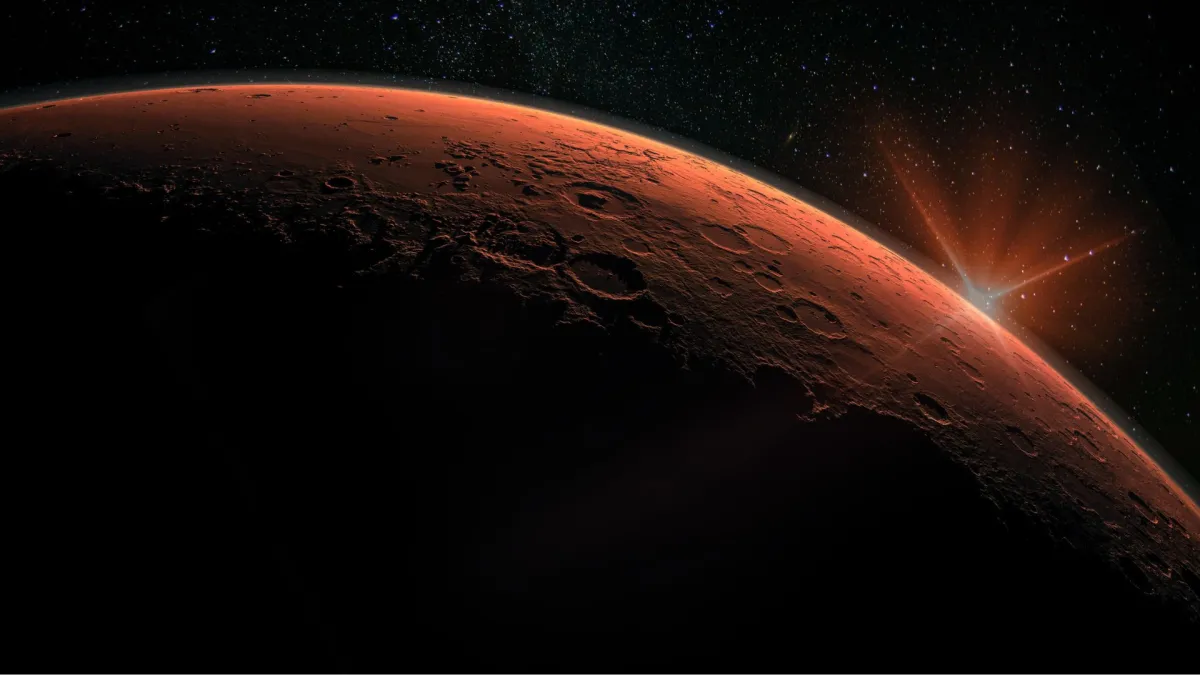
A Chinese rover has found new evidence which supports the theory that Mars was once home to a vast ocean, including traces of an ancient coastline, according to a study published on Thursday, November 7.
The theory that an ocean covered up to a third of the Red Planet billions of years ago has been a topic of debate among scientists for decades, and one outside researcher expressed some skepticism about the latest findings.
The Zhurong rover landed on Mars in 2021, on a plain in the Utopia region of the northern Martian hemisphere, where signs that there was water had previously been detected.
Since then it has been exploring the surface of the red planet, and some of the mission’s new findings were revealed in the study published in the journal Nature.
Bo Wu, lead author of the study from Hong Kong Polytechnic University, told AFP that several clues suggest there was an ocean in the area around the Zhurong landing area. Among these signs, “cones with holes, polygonal grooves and traces of flows.”
Screenshot
Was there a coastline on Mars?
Previous research has suggested that the pitted, crater-like cones could have arisen from mud volcanoes, which often form in areas where water or ice once existed.
Data from the rover, as well as satellite data and analysis on Earth, also suggest a coastline (as far as the water reached), according to the study. The research team estimated that the ocean It was formed by floods approximately 3.7 billion years ago.
Then the ocean froze, carving out a coastline, before disappearing about 3.4 billion years ago. according to your hypothesis. Bo emphasized that the team “does not claim that their findings definitively prove that there was an ocean on Mars.”
That level of certainty will likely require a mission to bring some Martian rocks back to Earth for closer inspection.

NASA/JPL-Caltech/MSSS
The coast is always changing
Benjamin Cardenas, a scientist who has analyzed other theories about a Martian ocean, was “skeptical,” speaking to AFP.
In his opinion, the researchers did not take enough into account to what extent the strong Martian wind has moved sediments and worn away rocks in the last billions of years.
“We tend to think of Mars as a not very active place, like the Moon, but it is active!” Cardenas said, from the University of Pennsylvania in the United States.
Cardenas recalled that previous research suggests that ‘even low Martian erosion rates’ would destroy signs of a coastline in such a long period.
Bo acknowledged that wind might have worn away some rocks, but noted that the impact of meteorites hitting Mars can also “excavate underground rocks and sediments to the surface from time to time.”
Although the theory overall remains controversial, Cardenas said he tends to “think there was an ocean on Mars.”
Uncovering the truth could help unravel a bigger mystery: if the Earth is unique in the Solar System for its capacity to host life.
“Most scientists think that life on Earth arose either under the ocean, where hot gases and subsurface minerals reached the seafloor, or very close to the point of contact between water and air,” Cardenas explained.
“Possible evidence of an ocean makes the planet seem more hospitable,” he added.
Source: https://www.noticiascaracol.com/mundo/rover-chino-descubre-pistas-de-un-oceano-perdido-en-marte-evidencia-de-vida-pasada-cb20


